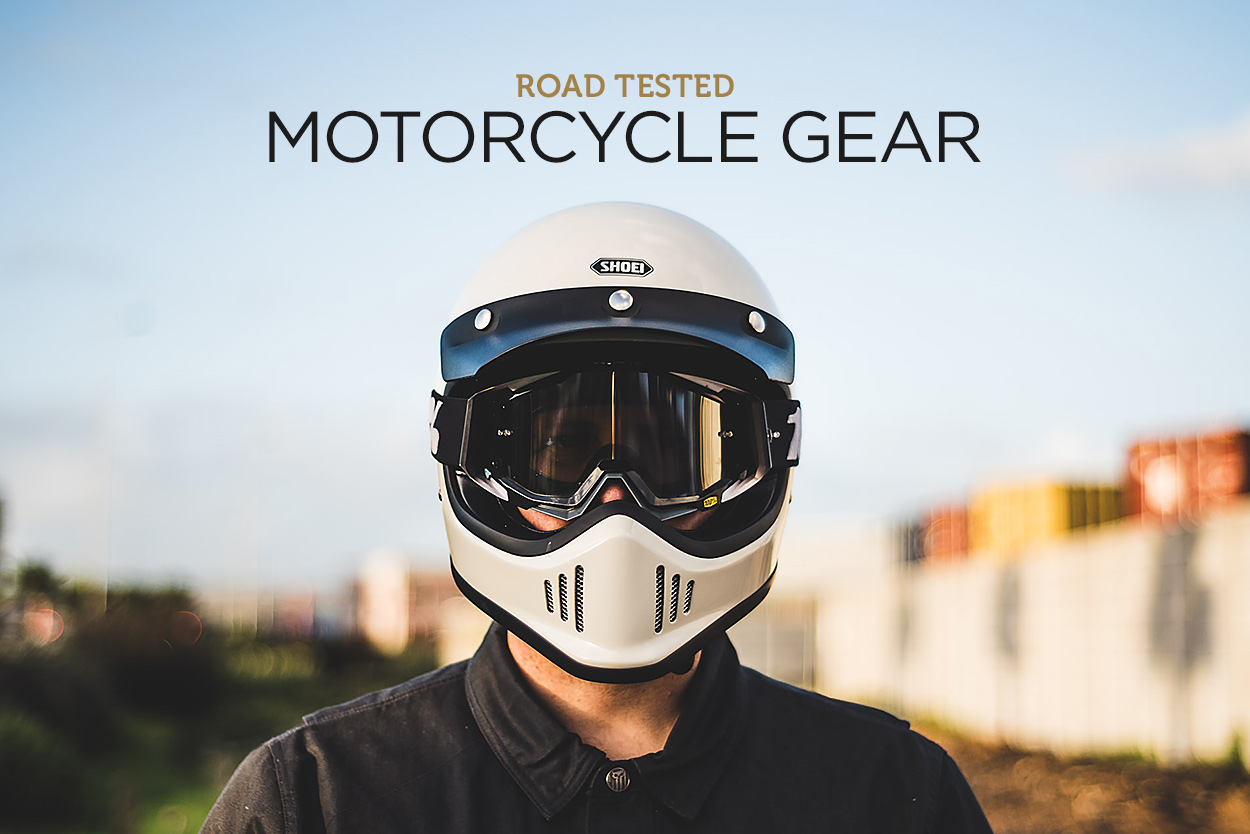
Looking good on your bike shouldn’t mean compromising safety. Join us as we check out Shoei’s new retro motocross helmet, a stylish pair of boots from Icon 1000, and gloves from Merlin.
Shoei EX-Zero Vintage motocross helmets are still hot property, with new models occasionally hitting the market. Today, we’re looking at Shoei’s entry in to the segment: the high-specced EX-Zero.
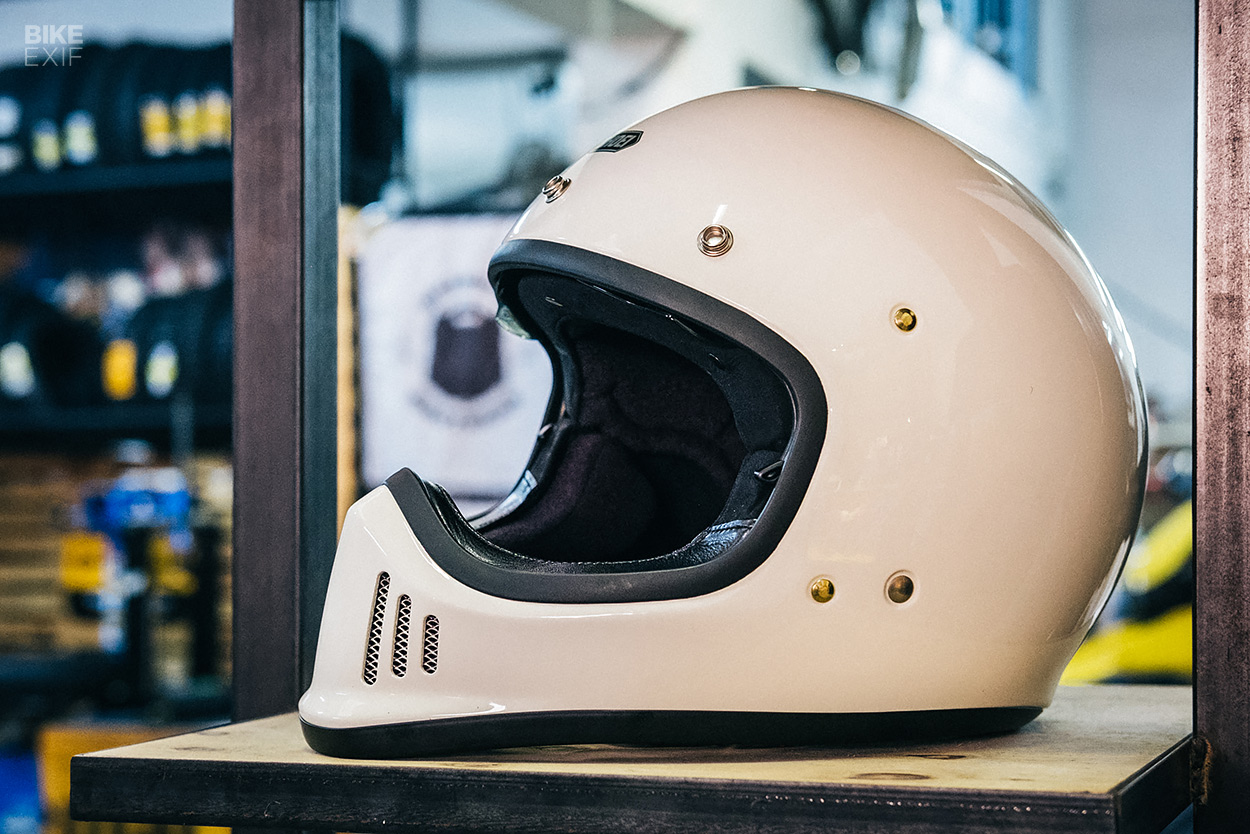
The EX-Zero is quite possibly the most modern ‘retro’ helmet on the market. Its design and styling is reminiscent of Shoei’s MX helmets in the 80s—models like the EX3 and Supra-X. So it’s a good-looking lid, with bags of attitude and smooth lines.
I love the classy little ducktail lip around the bottom of the front and back, and the six-vent design on the chin bar that’s lifted straight from its ancestors. It’s available in a few sweet color options too, with six flat colors and one graphic on offer.
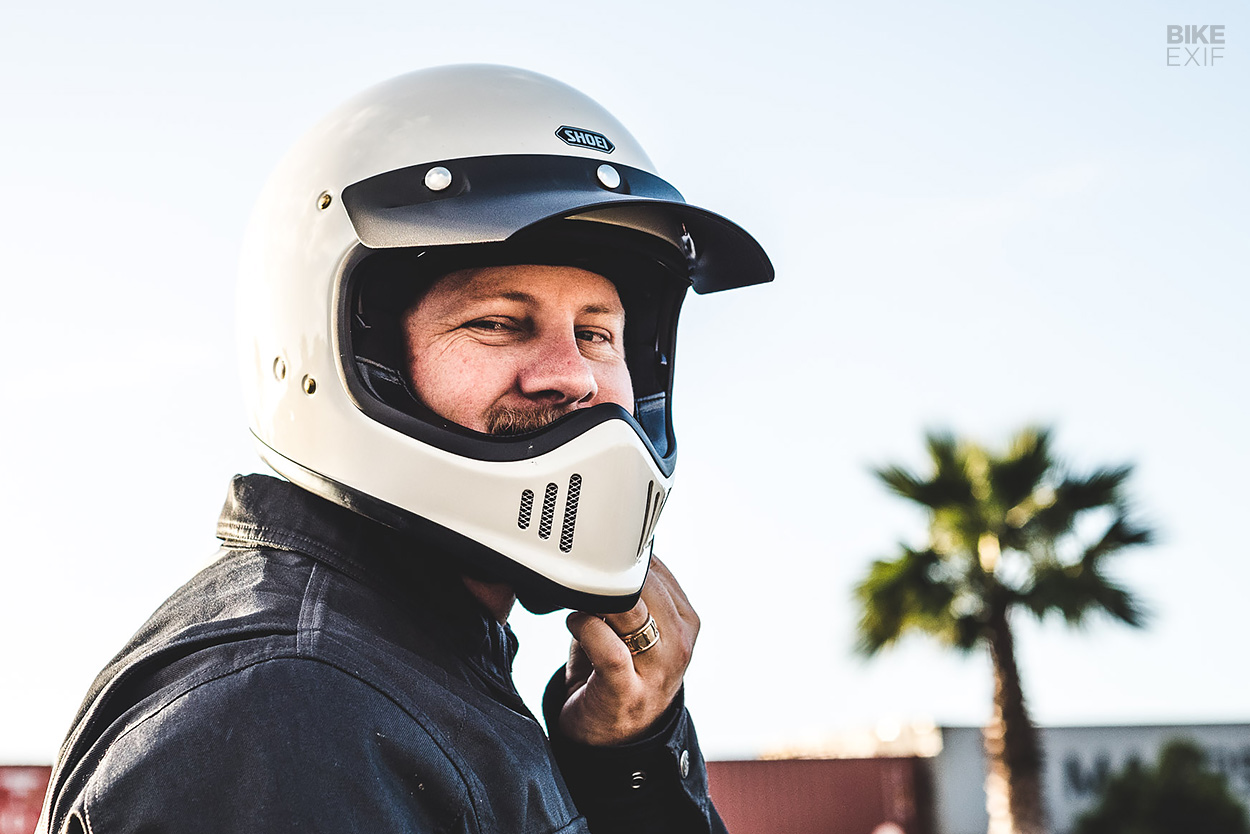
Looks aside, it’s built just like Shoei’s more contemporary lids. Holding it side-by-side with my Shoei RYD, the EX-Zero has the same 5-layer composite ‘Advanced Integrated Matrix’ shell, and the same plush, removable interior. And just like the RYD, its cheek pads have tabs for quick removal (to assist first responders in removing your helmet safely if things go random).
The EX-Zero’s also very well made and neatly finished. The liner is capped off around the eye port, and along the bottom of the helmet, with strips of faux leather and faux nubuck—adding to the old school feel without compromising the practicality of the modern liner.
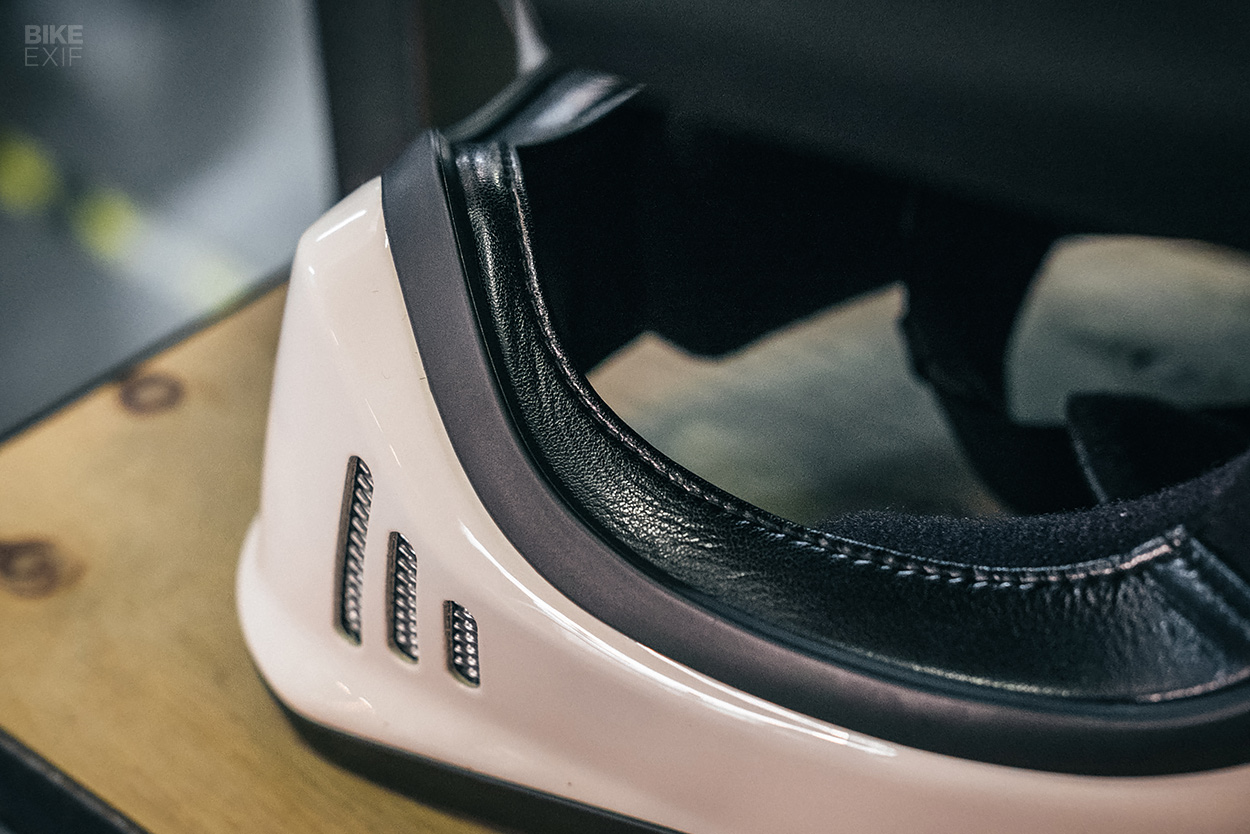
Everything feels premium, with no visible inconsistencies—from the paint to the wire mesh in the vents and the rubber edging, Except, of all things, the Shoei logo up top. It’s nothing more than a sticker, and on my helmet sits just skew enough to trigger my OCD.
Shoei has a reputation for helmets that fit great, and the EX-Zero lives up to it. There are no surprises in the size guide, and it feels cushy and comfortable straight out the box. There’s no official weight listed for the EX-Zero, but it’s light enough to be all-day comfy, and the liner does a solid job of keeping things breezy.
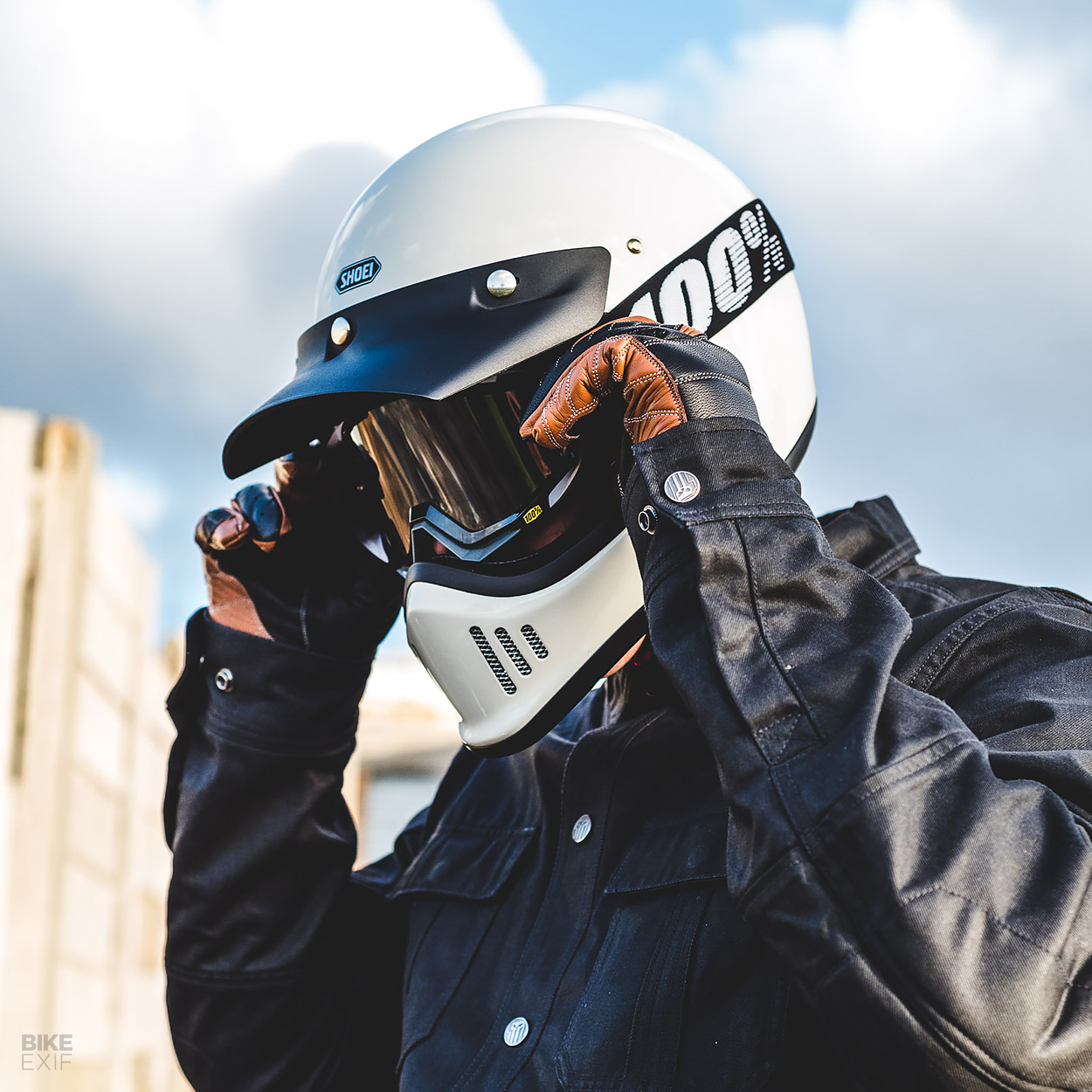
The eye port’s nice and spacious too—big enough to squeeze a in pair of the ubiquitous 100% Barstow goggles. But since this is a totally no-fuss design, there are a few caveats. That wide front opening and the chin bar vents let in enough air to keep you cool, but they’re always open. And while the EX-Zero isn’t as noisy as some other helmets in this style, it’s not exactly quiet either.
It is surprisingly aerodynamic though—even with the optional peak fitted. It’s a traditional three-snap arrangement, but it sits tight on the shell and does an excellent job of channeling air around it. Even at highway speeds I didn’t notice any rattling or head lifting.
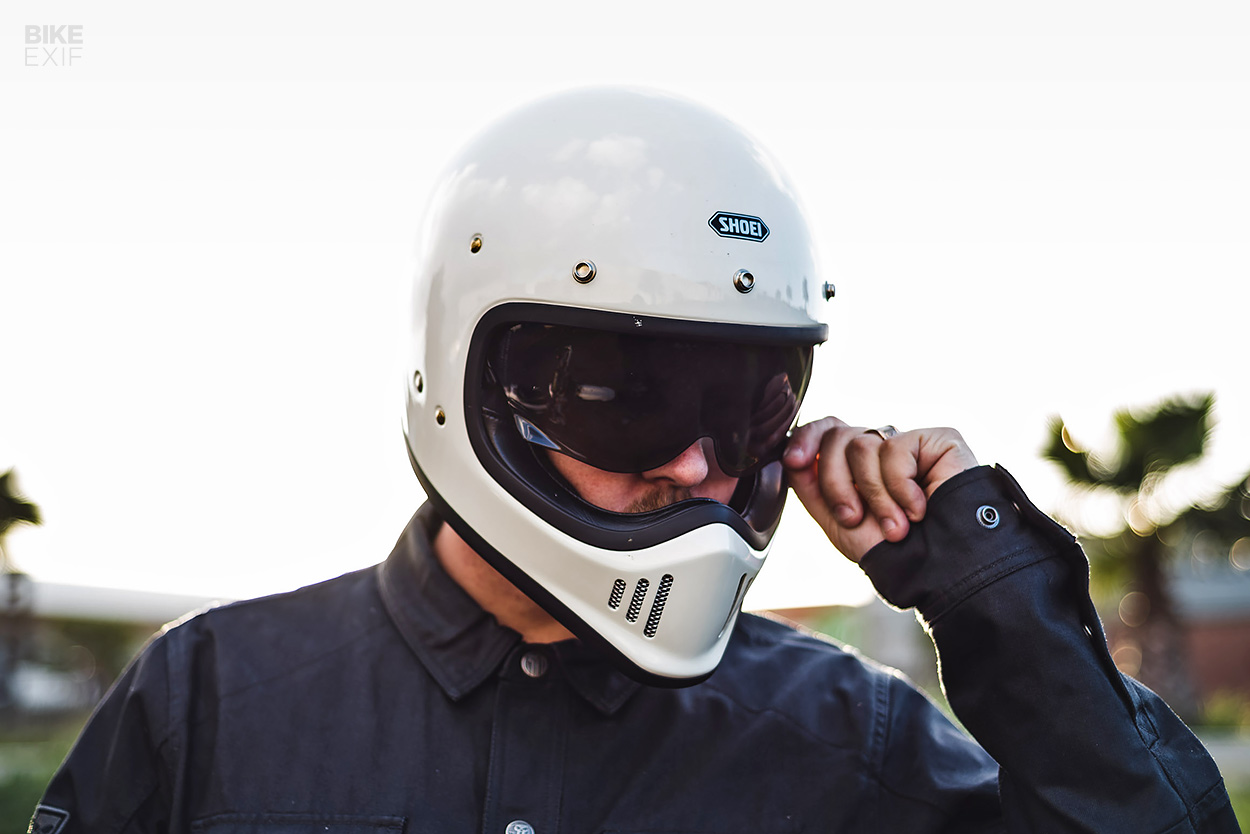
The EX-Zero’s also packing a very stealthy feature—a drop down visor that, in theory, negates the need for goggles. It hides away inside the shell, and drops down by pulling on one of two small tabs, located on either side. (A spring-loaded mechanism with a lever on the outside of the shell would have ruined the EX-Zero’s simplistic approach.)
Both the visor and the mechanism are very well thought out. You can set it to ‘stop’ at three different heights, depending on your face’s proportions. The helmet ships with a clear visor, but I swapped mine out for a tinted one in a matter of minutes.
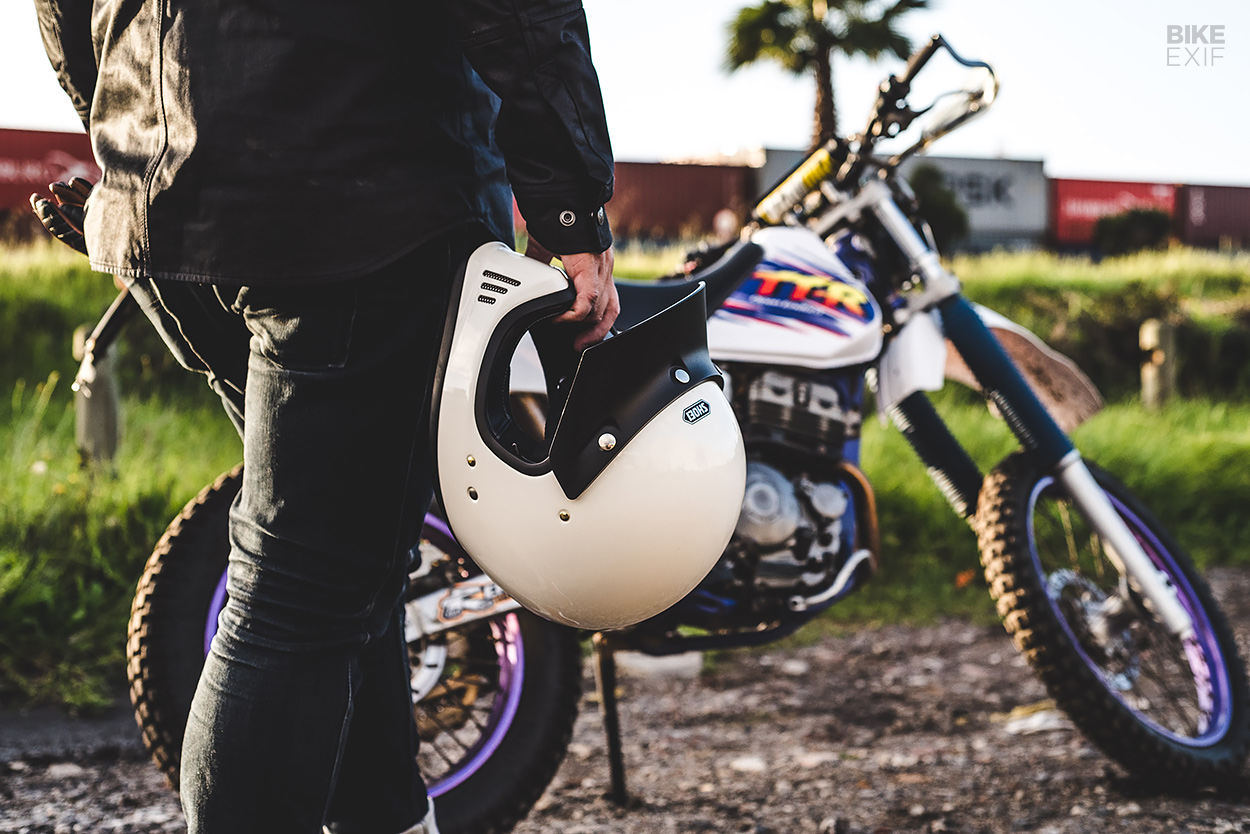
There is one fatal flaw with the system though—at anything over 40 mph, air starts to get around the visor. And at 50 mph, it’s pretty much useless. I found myself relying on it for quick around-town jaunts, but for longer rides a good set of goggles (and some ear plugs) are a must. If I had my way, I’d convince Shoei to ditch it altogether—which would hopefully knock the price down too.
At £359.99 (plus another £29.99 for the peak) the EX-Zero costs a fair chunk more than its direct competitor, the uber-popular Bell Moto 3. That said, I own both, and so far I’ve picked the EX-Zero every time—mainly because it’s so damn comfortable. [More]
![]()
Icon 1000 Varial Boot Whether it’s their gear or their outrageous custom bikes, Icon 1000 have always marched to the beat of their own drum. The new Varial boot embodies this ethos; mashing up different styles to create a boot that looks killer and keeps you protected.
The Varial is styled mostly like a casual boot, but with a few details that throw you. The sole has a strong sneaker vibe too it, and there’s a strap further up that’s not unlike those on vintage motocross boots. Icon 1000 have kept their branding extremely subtle, and loaded up on rad design elements—like the well padded and perforated tongue.
![]()
Made from full-grain leather, the Varial comes in either black or brown. I picked latter—partly because the specific leather used on the brown Varial is said to distress quicker, and I like my gear to look worn in. Be warned though: with no shifter pad built into the design, the area on top of my left boot got real messy, real quick. (I don’t mind it, but some people might.)
That leather’s also really supple, so the Varial doesn’t need to be broken in much. I picked my usual boot and sneaker size, and the sizing was spot on. It’s an easy boot to get on too—and that’s not something I can usually say about boots.
![]()
My Yeti-sized feet have high bridges, so any lace-up boot needs to be unlaced a bit before I can slip into it. Icon have very cleverly added an elasticated panel around the back of the ankle, along with a super-sturdy leather pull tab. Problem solved.
The lace system itself is a pretty straightforward affair, with metal hardware and barrel laces. That extra strap is a little fiddly to fasten down at first, but once in place it adds extra stability and holds the laces down a bit. (It’s a proper old school setup, with a small stud and three holes for basic adjustment.) There’s a ‘lace pouch’ built into the tongue too; it completely swallows loose ends, but tucking them in there’s a process.
![]()
As for protection, the Varial has reinforced material in the toe and heel, and D30 pads built into the ankles. It’s also about an inch higher than most ankle boots, making it feel just that little bit more secure. The footbed is reinforced and stiff enough for maximum stability on the bike, but with a little flex built in for when you’re off it.
At $175 it’s tough to beat the Varial’s style and protection combo. I’m pretty stoked on mine, and you can bet they’ll be in circulation for a long time. [More]
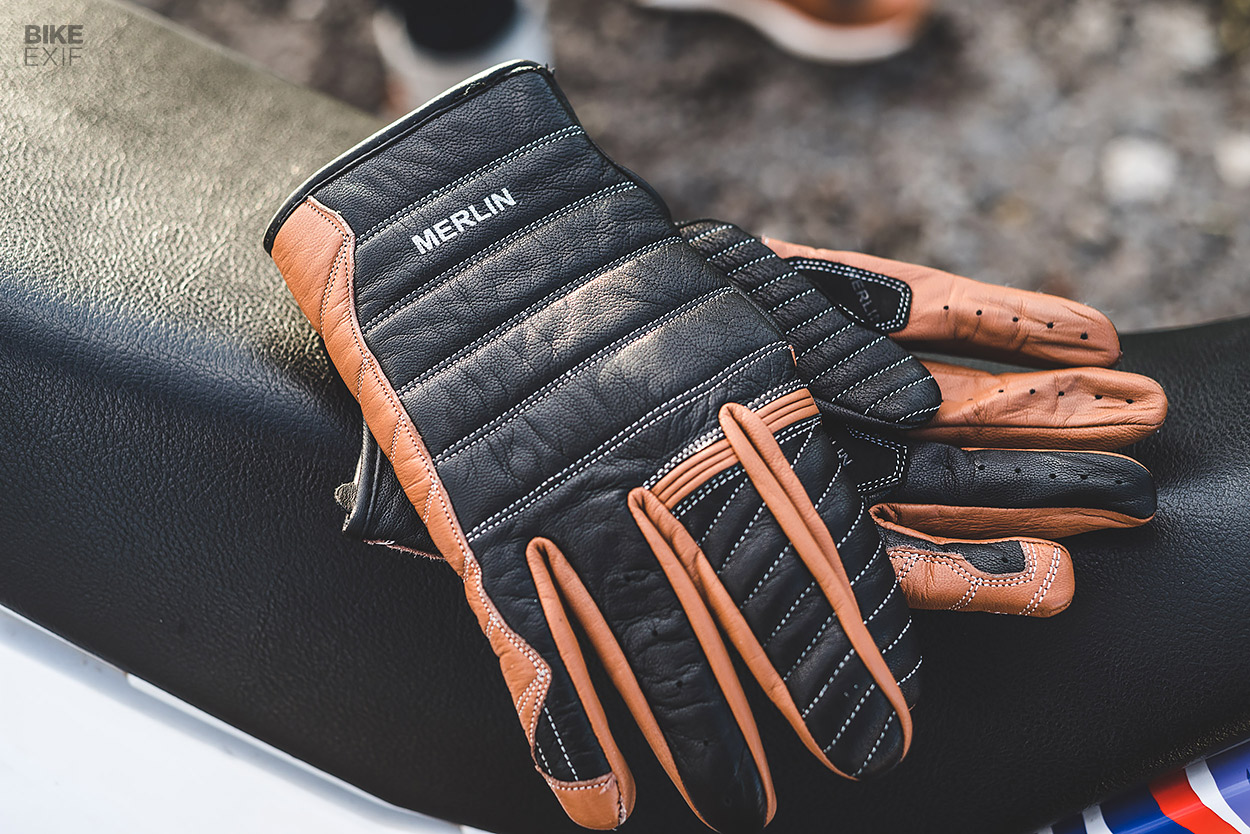
Merlin Boulder Glove British gear manufacturer Merlin are fast becoming known for making solid gear that doesn’t break the bank. Their stuff is among the best selling in our shop, so I figured I’d try out a pair of their gloves: the £79.99 Boulder.
The Boulder is an elegant cowhide glove with a very versatile style. Available in a black and brown combo with contrast stitching, it’s a short-cuff design that’ll look just as good on a cafe racer as it will a scrambler. It scores high on style; the contrasting leathers have been used well, and the stitching patterns vary in different areas of the glove.
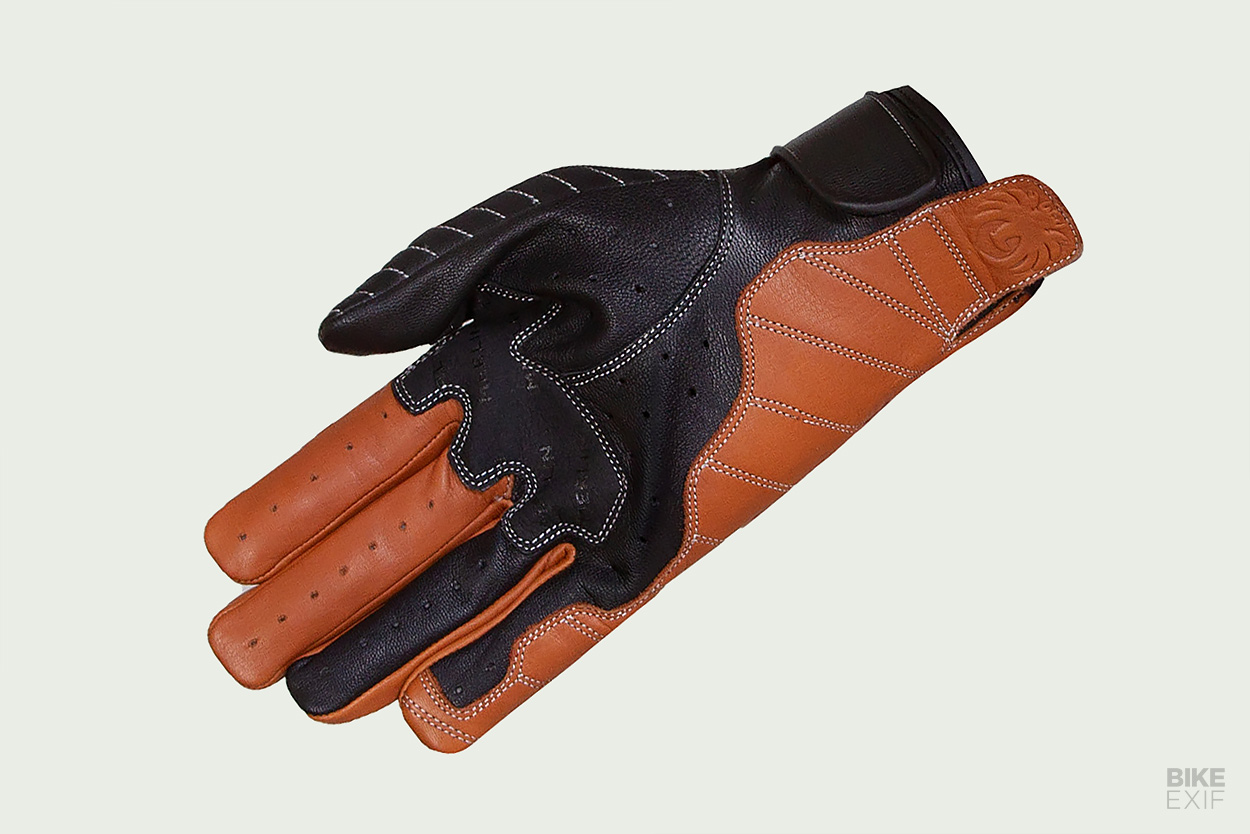
On the practicality side, Merlin have included a Velcro closure, a pull tab to help get the glove on, and some extra material on the palm. Perforation on the palm and fingers add a measure of ventilation too. There’s not much protection up top though—just some light padding on the upper panel.
The only branding is Merlin’s phoenix logo embossed on the pull-tab, and their name printed on top. The former feels classy, but the latter looks like an afterthought, and could have been executed better. My only other gripe is minor: each glove has two tiny leather tabs with holes just inside the cuff, to attach the gloves to the packaging. They have no use once the packaging’s been ditched, and I’ll probably end up snipping them off.
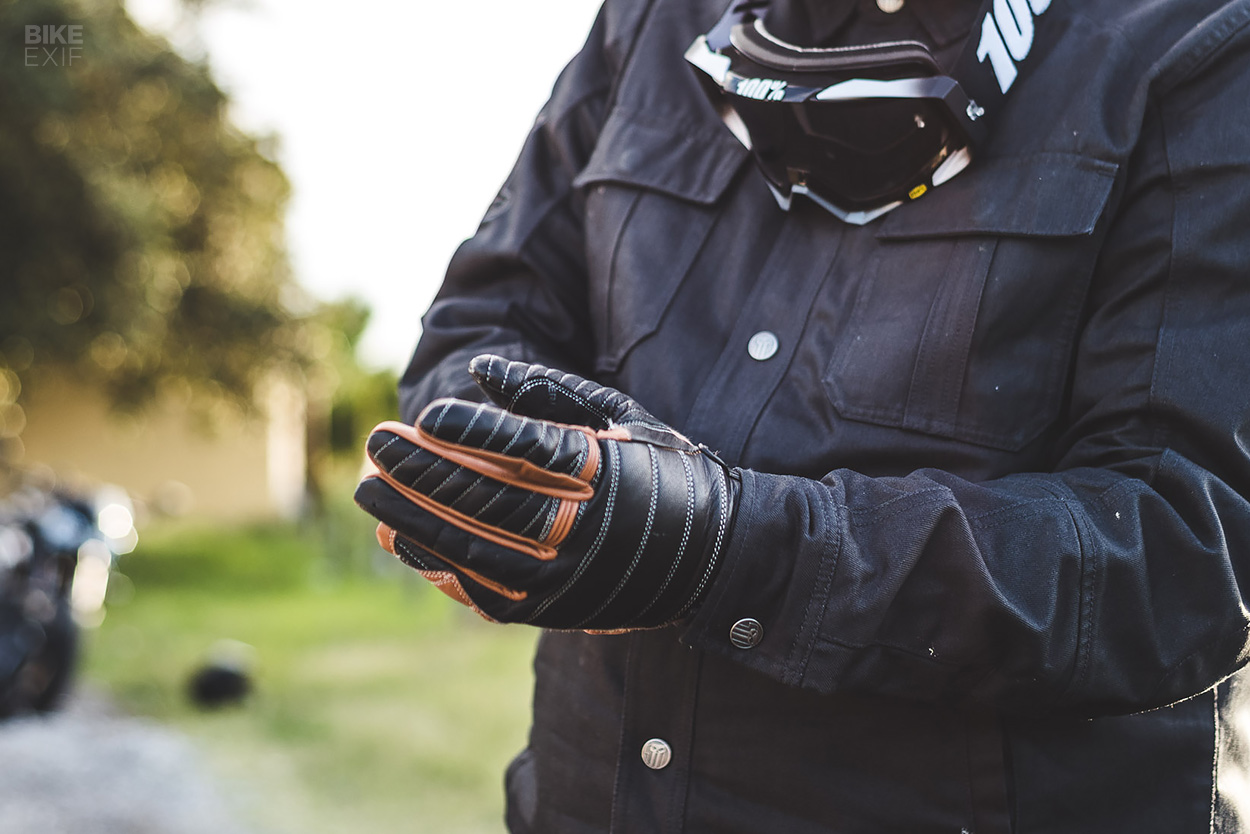
Other than that—and one or two untidy seams that I only really picked up when I looked very, very closely—the Boulder appears well made. Unfortunately I haven’t ridden in mine much, but that’s on me. Merlin’s gloves run roughly a size small—and I picked my usual size instead of first consulting their size chart. (Measure your hand and go according to their chart, and you should be fine.)
Even so, I have managed to squeeze my hands into the gloves a few times. And other than the fact that they’re too tight, they have a great, pliable feel to them. Chances are I’ll pass them onto a friend, who will no doubt get many happy miles out of them. [Buy]
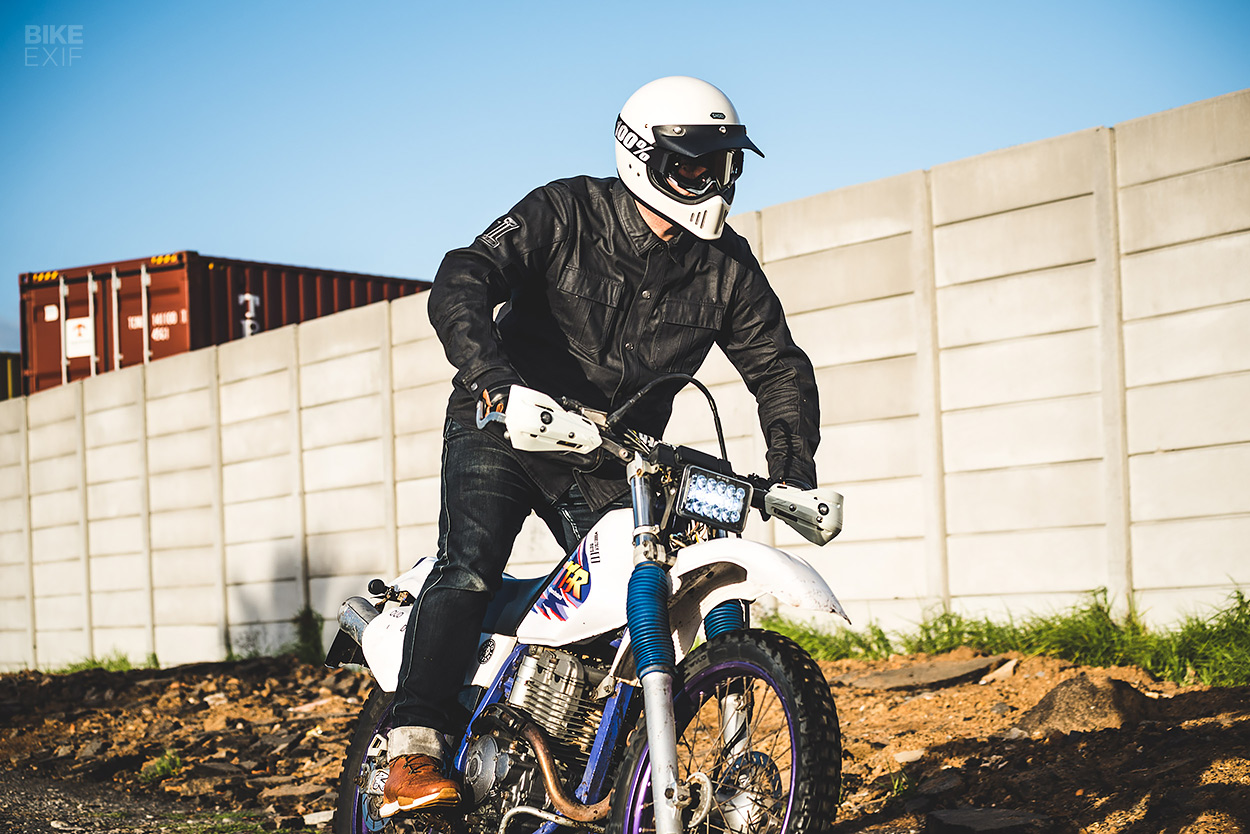
Location images by Devin Paisley